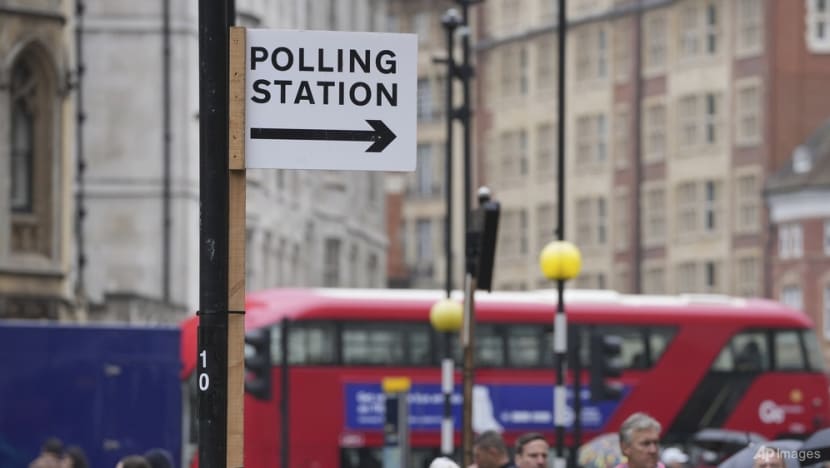UK general election: A guide

A polling station sign points to where local residents can cast their votes ahead of the general election, in London, Wednesday, Jul 3, 2024. (Photo: AP/Kin Cheung)
LONDON: British voters go to the polls on Thursday (Jul 4) in a general election that is widely expected to hand power to Keir Starmer's Labour Party and end 14 years of Conservative rule.
Prime Minister Rishi Sunak called the Jul 4 election in late May, despite not having to face the voters until early 2025.
So how does the voting in the UK election work and how is a winner decided?
HOUSE OF COMMONS
Voting will take place for all 650 members of parliament in the House of Commons - parliament's lower chamber - each representing a constituency or seat.
A total of 543 seats are in England and 57 in Scotland, with 32 in Wales and 18 in Northern Ireland.
There are 4,515 candidates this year - a record.
The increase is down to hard-right Reform UK's decision to end its 2019 promise not to stand against the Conservatives and more Green party hopefuls.
In all, Prime Minister Rishi Sunak's Tories are fielding candidates in 635 seats, with 631 for Starmer's Labour and 630 for the Liberal Democrats, led by Ed Davey.
Reform UK, led by Nigel Farage, has 609 with 629 for Carla Denyer and Adrian Ramsay's Greens. The remainder are running for smaller parties or as independents.
HOW IS THE WINNER DECIDED?
The UK general election uses the first-past-the-post system, which means the candidate and party with the most votes wins.
For an overall majority, a party has to secure at least 326 seats.
But in reality, the figure is lower as the Speaker - an MP who is by convention elected unopposed in his or her constituency - and their three deputies - also MPs - do not vote in parliament.
MPs from the pro-Irish nationalist Sinn Fein party do not take up their seats in the UK parliament because they do not recognise British sovereignty over Northern Ireland.
A hung parliament occurs if no single party wins a majority. In this case, the incumbent prime minister remains in power and is given the first chance to form a government either by building a coalition or governing with a minority.
WHEN WILL RESULTS BE ANNOUNCED?
Polls open at 7am (6am GMT) on Jul 4 and close at 10pm.
An exit poll, commissioned by UK broadcasters BBC, Sky News and ITV News, is published when voting ends. The survey of voter behaviour is seen as an accurate indicator of the result.
Ballots are counted immediately after polling ends, with the results declared from late evening into Jul 5.
Most are declared overnight and the outcome is usually clear between 5am and 7am.
Related:
WHEN WILL THE NEW PM TAKE OFFICE?
Once the overall result is clear, and if the governing party has lost, the prime minister would be expected to tender his resignation to King Charles III on Friday.
The leader of the winning party will then meet the king, who will request he or she form a government. They will then head to Downing Street to make a speech to the British public as the new prime minister.
The next biggest party becomes His Majesty's Official Opposition, with a Shadow Cabinet of MPs as counterparts to government ministers.
If there is a new prime minister, he or she will begin appointing ministers, starting with senior positions.
Parliament is scheduled to return on Jul 9. The Speaker of the House of Commons will be elected from among MPs.
Each MP will then in turn swear the oath of allegiance to the king or make a solemn affirmation. This usually takes a few days.
The State Opening of Parliament and King's Speech, setting out a government's programme of legislation for the parliamentary session, is due to take place on Jul 17, although this date could be changed by a new government.
2019 ELECTION
At the last general election, held on Dec 12, 2019, Boris Johnson's Conservatives were runaway winners with 365 seats, with Labour on 202.
The Scottish National Party won 48, followed by the Liberal Democrats on 11.
Northern Ireland's pro-UK Democratic Unionist Party secured eight seats, with Sinn Fein on seven, and Welsh nationalists Plaid Cymru on four.














